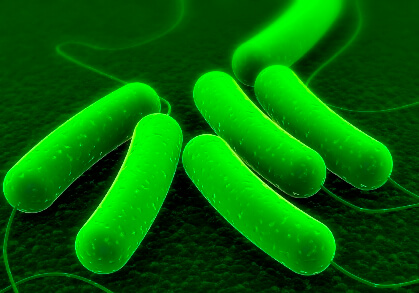"This study demonstrates to us that it is possible to reduce the cost of one of the most expensive steps in the biofuel production process - the addition of enzymes aimed at breaking down cellulose into fermentable sugars" said the lead researcher

An important milestone was recently reached on the way to the development of advanced biofuels that could replace gasoline, diesel and jet fuel as clean and "green" renewable alternatives.
Researchers from the US Department of Energy collaborated with a scientific research institute (BioEnergy Institute) in engineering the first strains of Escherichia coli bacteria capable of digesting a type of grass (a type of switchgrass) and extracting from it sugars that are converted into all three types of fuels: gasoline, diesel and jet fuel . And more importantly, the bacteria are able to do this without the need for the help of enzymes as reaction additives.
"This study demonstrates to us that it is possible to reduce the cost of one of the most expensive steps in the biofuel production process - the addition of enzymes aimed at breaking down cellulose into fermentable sugars," says Jay Keasling, lead researcher. "The process will allow us to reduce the production costs of Delek by merging two separate stages - the breakdown of cellulose and hemicellulose into sugars and the fermentation of these sugars into fuels - into a single stage or reaction in a common vessel." The research findings were published in the scientific journal Proceedings of the National Academy of Sciences (PNAS).
Many researchers believe that advanced biofuels, produced from biomass derived from wood pulp of crops not intended for human consumption and agricultural waste, represent the best source of renewable liquid transportation fuels. Unlike ethanol, which is usually produced from corn starch, these bio-fuels are able to replace gasoline on the basis of the same price, and it will be possible to use them in engines and other equipment that exists today without adapting them for this. The biggest obstacle in the production of advanced biofuels is the high cost of their production, which keeps them from being competitive with the fuels that exist today.
Unlike the simple sugars found in corn kernels, the cellulose and hemi-cellulose found in the biomass of plants is difficult to exhaust, since they are firmly embedded in the wood material called lignin. After the extraction of these complex sugars, it is necessary to turn them (by hydrolysis = decomposition) into simple sugars and then prepare the necessary fuels from these.
One of the approaches is to pre-treat the biomass using ionic liquids (molten salt) aimed at dissolving these complex sugars, and then use a single engineered microorganism designed to both digest the dissolved biomass and produce the same hydrocarbons suitable for fuel production. "Our goal was to transfer as much of the chemistry as possible into the bacteria," explains one of the researchers. "In order to obtain those advanced fuels, the process requires the use of a bacterium that includes a metabolic pathway for the production of that hydrocarbon (sugar) and the ability to break down biomass, as well as the ability to secrete enzymes that efficiently break down cellulose and hemi-cellulose. "We are now able to engineer strains of the bacterium Escherichia coli that are able to utilize both the cellular and the hemicellular segments of millet that have been pre-treated with ionic liquids."
The bacterium Escherichia coli is not able to grow on millet, normally, but the researchers engineered strains of it that express several enzymes capable of digesting cellulose and hemicellulose and using them for their development. In these transgenic strains of Escherichia coli, three metabolic pathways have been combined that allow them to produce alternative molecules or precursors to oil, suitable for gasoline, diesel and jet engines. Although this is not the first time that Escherichia coli strains have produced gasoline and diesel from sugars, it is the first demonstration of a strain capable of producing all three types of transportation fuels. One of the researchers explained that the early treatment with liquid ions was essential for the success of the process. "The magic lies in the early treatment with an ionic liquid," notes the researcher. "I believe that if we can improve it further, the early ionic liquid treatment process could be suitable for any plant biomass.

4 תגובות
The last article in Scientific American that summarized the state of biofuel production in all the main approaches that exist today was not optimistic who knows what. I hope that these are really significant steps and that the next article will reflect this. On the other hand, maybe salvation will come at all from the solar field or the LENR.
And then God forbid these bacteria will spread in nature and damage agricultural crops, the Tower of Babel is here.
If the process "ripens" into industrial production, there is a chance that at least part of the competition will be resolved
between agricultural fields for growing food and growing fuel and moderate the increase in food prices,
Because the process will result in the production of fuel (fuel not fuels) from agricultural and cellulosic waste which does not have it
Food value, and again: fuel is fuel is fuel, in Hebrew there are no fuels.
All kinds of unclear things - in a salt solution, the solubility of sugars should decrease compared to the solubility in distilled water, is it possible that the salt solution causes damage to the cell wall and makes it easier for the sugars to come out?
Secondly, Hetva talks about the advantage of producing energy from biomass that does not compete with growing food, but millet is food just like corn.